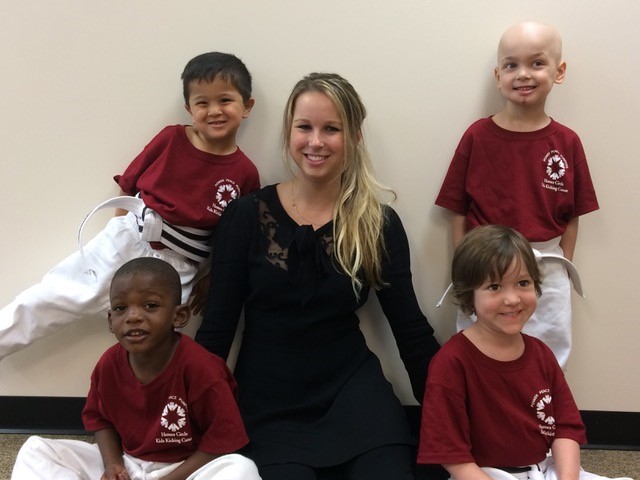 Hilary Marusak, Ph.D., a post-doctoral fellow in Wayne State University’s Department of Pharmacy Practice, was awarded a Supportive Care Research grant from the St. Baldrick’s Foundation, the nation’s largest private founder of childhood cancer research. The one-year, $50,000 grant will support Marusak’s work studying whether a martial arts therapy that focuses on meditation and breathing techniques can reduce pain experienced by childhood cancer patients. Christine Rabinak, Ph.D., Felicity Harper, Ph.D., and Dr. Jeffrey Taub of WSU are study co-investigators.
Hilary Marusak, Ph.D., a post-doctoral fellow in Wayne State University’s Department of Pharmacy Practice, was awarded a Supportive Care Research grant from the St. Baldrick’s Foundation, the nation’s largest private founder of childhood cancer research. The one-year, $50,000 grant will support Marusak’s work studying whether a martial arts therapy that focuses on meditation and breathing techniques can reduce pain experienced by childhood cancer patients. Christine Rabinak, Ph.D., Felicity Harper, Ph.D., and Dr. Jeffrey Taub of WSU are study co-investigators.
“Because children’s brains are more sensitive when they’re developing, pain and stress experienced at a young age increases risk for mental health problems, as well as learning and memory issues,” said Marusak. “This project will examine childhood cancer as another unique type of stressor to better understand the impact of behavioral therapy and ultimately design the most effective intervention.”
Marusak, who earned a Ph.D. in translational neuroscience from Wayne State in 2016, will work with Kids Kicking Cancer, a Michigan-based nonprofit that teaches children fighting cancer the mind-body techniques of martial arts instruction, breath work and meditation. The organization, founded by Wayne State University School of Medicine assistant clinical professor of pediatrics Rabbi Elimelech Goldberg, offers these classes at hospitals free of charge to help children move beyond the pain and discomfort of their disease.
“One of the things I really find remarkable about Kids Kicking Cancer is that, in addition to teaching children martial arts and breathing techniques, they help children reframe their self-perspective,” Marusak said. “The kids learn to see themselves as a victor, rather than a victim. I think that powerful, positive thinking will also be a really critical therapeutic component.”
While there is evidence that these kinds of behavioral therapy techniques have had strong effect on pain, distress and underlying brain areas in adults, Marusak said that little research has been conducted on how they impact children’s brains.
Marusak’s research, which is also supported by the American Cancer Society, will focus on 14 children between the ages of six and nine who are either cancer patients or survivors. She will survey them about their pain levels, emotions and mental health, and then complete a non-invasive MRI scan to look at their brain structure and function, specifically within pain and emotion processing brain areas. From there, the children will complete four classes with Kids Kicking Cancer before returning for a comparison survey and MRI.
“Many families say that the invasive and sometimes painful medical treatments associated with cancer care are some of the most stressful parts of childhood cancer,” Marusak said, “and many experience pain related to the cancer itself, or side effects of treatment. Even among survivors of childhood cancer, many report pain associated with cancer and its treatment well into adulthood. If these types of behavioral therapy techniques can help build resilience in a young patient’s brain and improve their ability to process stress and pain without medication, it’s more than worth studying.”
